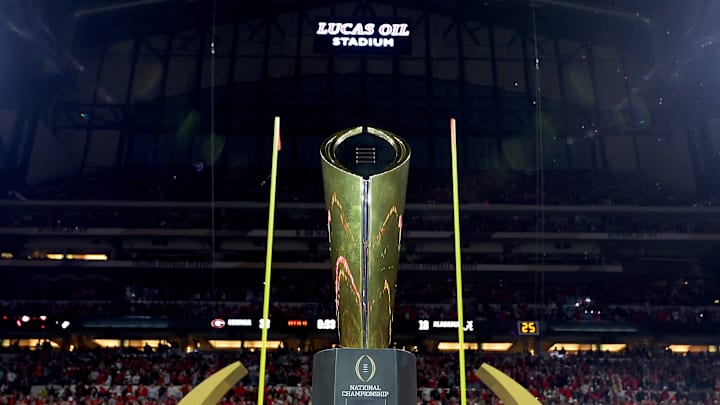The only constant in life is change. Oh, the irony... Regardless of how you feel about this newfangled change thing and all, we will be experiencing that quite a bit on the college football field this year.
Now that you have gotten your wits about you with NIL, the transfer portal and other multiple signing days, get a load of this! The College Football Playoff will be expanding from four teams to 12 this season.
While ESPN will be broadcasting most of these games, along with Turner Sports taking on a pair of first-round games, the viewing experience may be different. The criteria for getting into the playoff has changed quite considerably. Instead of the four best teams, the five highest-ranked conference champions get in, followed then by the seven best teams after that. What could possibly go wrong?
The four highest-ranked champions will get a first-round bye to the national quarterfinals, which will be played on neutral sites. The New Year's Six (Cotton, Fiesta Orange, Peach, Rose, Sugar Bowls) will compromise the four national quarterfinal games and the two national semifinals. The national championship will be played at another neutral site, which will be Mercedes-Benz Stadium in Atlanta.
Now that I have your attention, I will blow your mind with a few more wrinkles with this playoff format.
Everything to know about the expanded College Football Playoff format
Now that you have an idea when it comes to how the College Football Playoff Selection Committee will go about picking its 12 teams, get ready for the utter madness to ensue. For all intents and purposes, the winner of the ACC, Big Ten, Big 12 and SEC will get first-round byes as top-four seeds in this new postseason format. The Group of Five winner gets in too, but likely will be the No. 12 seed.
From there, the seven best non-conference champions, plus presumably the Group of Five champion (AAC, CUSA, MAC, Mountain West, Sun Belt) will play first-round games at home stadiums of the higher-seed team's choice. No. 5 will host No. 12, No. 6 will host No. 11, No. 7 will host No. 10 and No. 8 will host No. 9. For example, SEC runner-up Texas (No. 5) would host G5 champion Liberty at DKR.
For most higher-seeded teams, they will have these first-round games being played at their stadiums. There is, however, a caveat in place. A higher-seeded team can host a game at a neutral-site of their choosing, if they seem fit. For example, if Army won the AAC and got to host a first-round game, the Black Knights would likely go with much-larger MetLife in East Rutherford than Michie at West Point.
There are two real frustrating parts with this format. One, is that the SEC and Big Ten runner-up may be better than both the ACC and Big 12 champion. For example, Oregon could be the fourth-best team in the country, but since they lost the Big Ten title to Ohio State, they will be relegated to the No. 6 seed. It doesn't seem right, but the Selection Committee wants to prioritize winning one's league.
The other big point of frustration is how Notre Dame factors in all this. If the Irish were to go 10-2 or better as a national independent with a strong schedule, they can never get a top-four seed, meaning they'd have to play a first-round game no matter what. Then again, they don't have to play a conference championship, so they kind of get a mini bye anyway. It is not as bad as the Power Four.
From there, we have a 12-team, single-elimination tournament to crown a new college football champion. It will be a battle of attrition, but more often than not, the best team will prevail. College football sickos like myself will watch every play of every game, but I can sense potential fatigue from the causals to non-fans. The fact we'll be having more games played in December will be interesting.
There may be other unintended consequences of going to this format, but we'll have to wait and see.
